Our studio is located in Berlin where we run our activities, host informal gatherings and discussion groups. This includes presentations and workshops, as well as study circles on a range of topics.
The studio is home to The Anomalous Reading Room, a library devoted to sound studies and listening practices, including books, documents and recordings from a range of contexts, as well as literature on critical and political theory, postcolonial and gender studies, poetic thought and planetary thinking.
Our work on the cultural paper, Free Berlin, is also based at the studio, where materials emerge by keeping close to initiatives and debates as well as through input from those passing by.
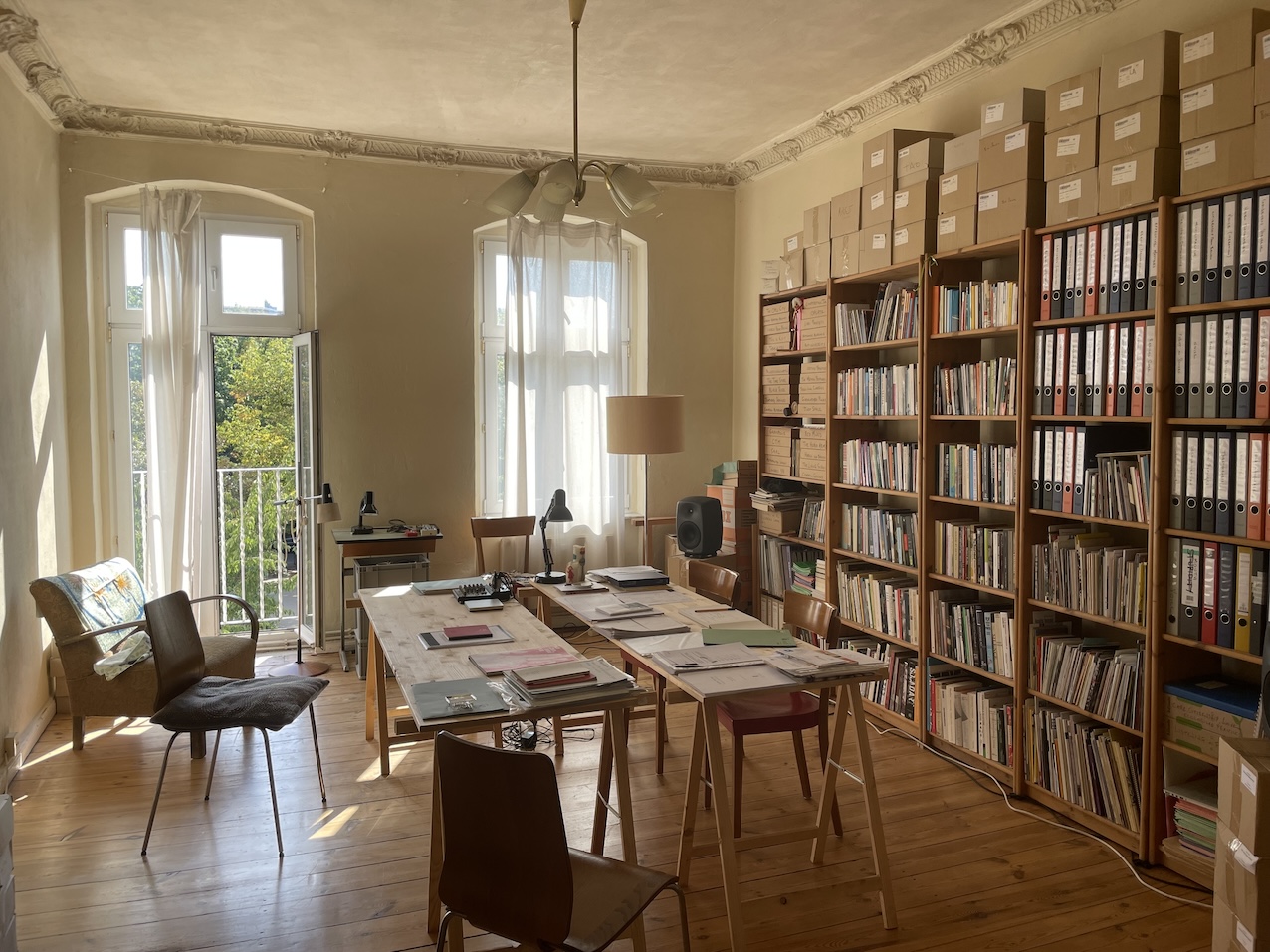
Recent Activities:

Study Session with Brandon LaBelle
Thursday, December 5 / 14:00-17:00
Errant Bodies studio, Lettestrasse 7, 10437 Berlin
For this study session, Brandon LaBelle will share reflections on the concept of Third Listening. This includes exploring understandings of intersubjectivity and mutual recognition, following the work of psychoanalyst Jessica Benjamin, and how “thirdness” enables ways of working at repair. We’ll think together around listening as a support, as protection, as ways of holding, as well as an intervention onto systems of harm. This will include exploring the work of Gilles Clément and his notion of third landscape: as zones of biological flourishing. Third Listening is offered as a speculative, creative and ecological framework; it is an invitation to share, to find out ways of listening and speaking anew, especially in times of pronounced repression. As adrienne maree brown suggests, listening is an essential form of medicine.
Brandon LaBelle is an artist, writer and organizer living in Berlin. He is the artistic director of The Listening Biennial and related Listening Academy. His work focuses on questions of agency, community, pirate culture, and poetics, resulting in a range of collaborative and extra-institutional initiatives, including Communities in Movement (2019-2023), The Living School (with South London Gallery, 2014-16), Oficina de Autonomia (2017), The Imaginary Republic (2014-19), Dirty Ear Forum (2013-22), Surface Tension (2003-2008), and Beyond Music Sound Festival (1998-2002). In 1995 he founded Errant Bodies Press, an independent publishing project supporting work in sound art and studies, performance and poetics, artistic research and contemporary political thought. His publications include: Dreamtime X (2022), Acoustic Justice (2021), The Other Citizen (2020), Sonic Agency (2018), Lexicon of the Mouth (2014), Acoustic Territories (2010, 2019), and Background Noise (2006, 2015).

Study Session with Amanda Gutiérrez
Thursday, November 17 / 14:00-17:00
Errant Bodies studio, Lettestrasse 7, 10437 Berlin
For this study session, Amanda Gutiérrez proposes to focus on the work of Gloria Anzaldúa through sharing her audio-video work, Borderland feedback, a video memorial for Gloria Anzaldúa (2024), created on the 20th anniversary of her passing. We’ll discuss and reflect upon Anzaldúa’s life and work, reading together certain passages of Borderlands/La Frontera (1987) as well as engaging with Gutiérrez’s research creation and related practice, including reflecting upon ways of listening to the dead. Please join us for this intimate listening and reading session.
Amanda Gutiérrez (b. 1978, Mexico City) explores the experience of political listening and gender studies by bringing into focus soundwalking practices. Gutiérrez uses a range of digital media tools to investigate everyday life aural agencies and collective identities. Approaching these questions from aural perspectives continues to be of particular interest to Gutiérrez, who completed her MFA in Media and Performance Studies at the School of the Art Institute of Chicago. She is currently elaborating on the academic dimension of her work as a Ph.D. student in Arts and Humanities at Concordia University in the Arts and Humanities Doctoral program. Her experience as an artist has been shown internationally in art residencies such as FACT, Liverpool in the UK, ZKM in Germany, TAV in Taiwan, and Bolit Art Center in Spain, and her sound artwork has been exhibited internationally in venues such as The Liverpool Biennale in 2012, Harvestworks in NYC, SBC Gallery Montreal, City of Women Festival in Ljubljana, To)POT festival, ENSEMS Music Festival in Valencia 2023, among others.
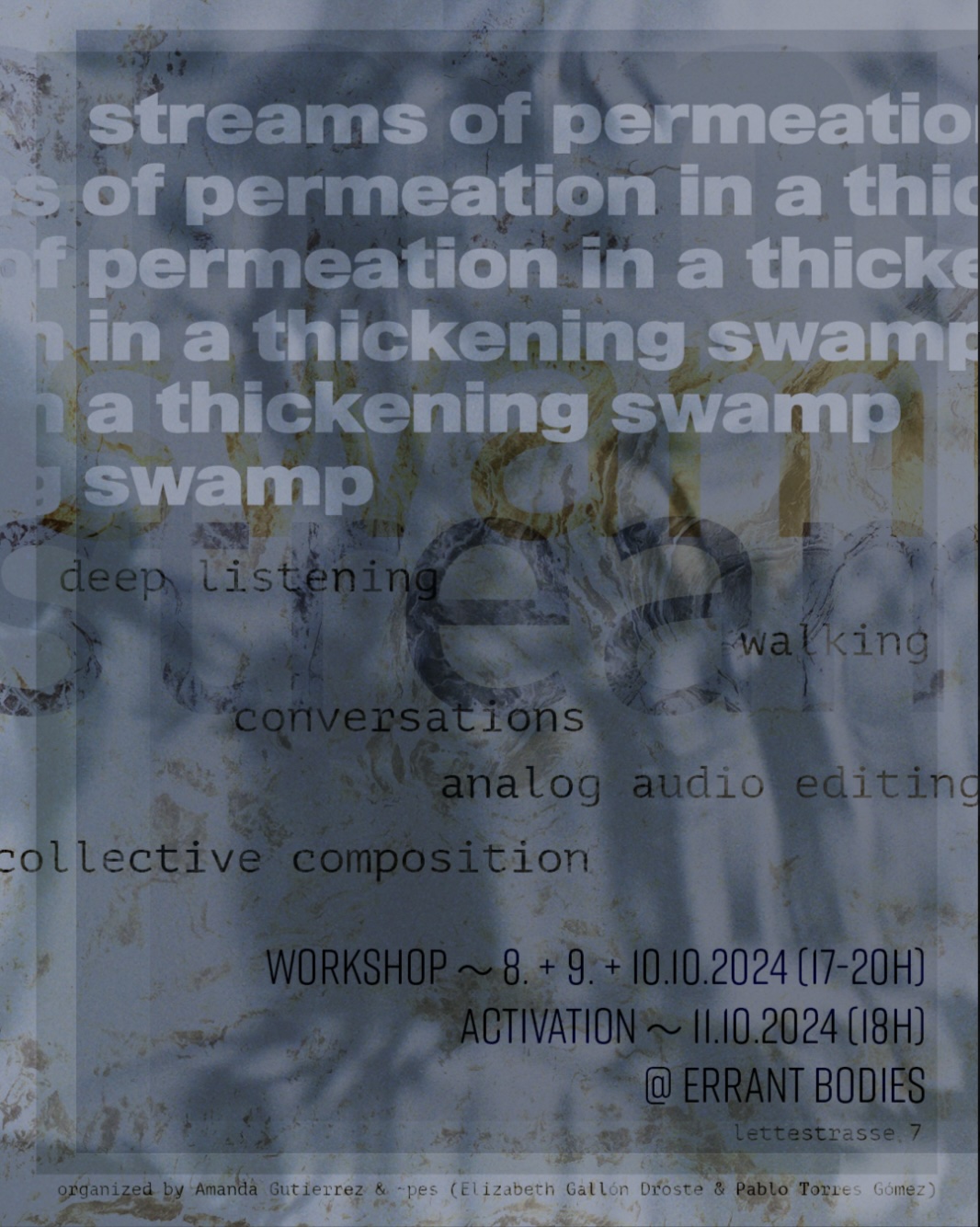
streams of permeation in an ever-hardening swamp – Workshop with Amanda Gutiérrez and Pes Collective (Pablo Torres Gomez and Elizabeth Gallon Droste)
an urban swamp, multilayered-basin absorbing sulfur dioxide and nitrogen oxide, holds bustling streets and cacophonic skies. A homogeneous substance hardens regulatory systems solidifying oppressive infrastructures. Compressed mud, once annelids and mollusks, are pierced by leaking echoes catalyzed by viscous amalgams defying absorption; they tremble underneath. Subterranean rivers sculpted by humming stories smeared with roots, rocks, sand, and clay. Dynamic, they ooze as aqueous traces; what stories do they echo?
built on a swamp, Berlin's underground waters and aquifers bear the marks of industrialization, war, reconstruction, and ecological change. Chemically, these waters are described as hard, due to their high levels of calcium and magnesium, a result of the city’s geological layers of limestone and chalk. What relations could we trace between Berlin’s hard waters and the city’s sociopolitical and geographic life?
streams of permeation in a thickening swamp is a three-day workshop from October 8th - 10th through which we will share exercises to attune to the city’s hardened and silenced waters, reflecting on the overheard relationships embedded within their errant streams and their socio-political dimensions including water access, weaponization, and solidarity.
drawing inspiration from First Nation scholar Donald Dwayne's concept of wâhkôhtowin, meaning "bent-walking-over-the-land reciprocity," writer Cristina Rivera Garza “Archiving Composively,” and William Burroughs “Cut-up method,” we will share conversations, deep listening, walking, and collective composition exercises with which to mourn, resonate, and listen to Berlin’s murmuring waters and the voices of resilience in times of political unrest, opening questions on how to transform political hardness into shared experiences of care, attention and empathy.
October 8th: tuning to errant streams
October 9th: deriva ~ soundwalk
October 10th: composition of the mourning chorus
please fill out the form to participate.
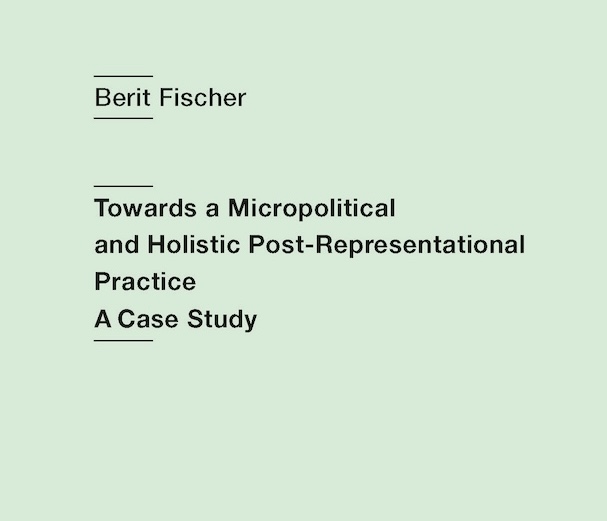
Towards a Micropolitical and Holistic Post-Representational Practice, A Case Study by Berit Fischer
Saturday, November 25, 2023 / 19h
Errant Bodies studio, Cotheniusstraße 6, 10407 Berlin
We cordially invite you to the book launch of Towards a Micropolitical and Holistic Post-Representational Practice, A Case Study by Berit Fischer
Berit Fischer will share with us her research and activities in micropolitical practices, from cultures of empathy to regaining ecological futures.
Berit Fischer (PhD) is a transdisciplinary cultural practitioner. She is a curator, scholar, artist, writer, and an editor with focus on experiential and socio-ecological knowledge formation, critical spatial and transformative emancipatory practices, that are often inspired by feminist- and radical pedagogies. In 2016 she founded the Radical Empathy Lab, an ongoing nomadic socio-ecological and research laboratory for experiential knowledge formation. She is the founder and curator of the (Re-)Gaining Ecological Futures festival at the Floating University, Berlin.
"… to expand beyond representation, to conquer an intimacy with the body as a vibratile surface that detects the waves even before they arise, to learn how to surf, establish zones of familiarity within the movement itself – that is 'sailing is necessary,' because if we don't, our destiny will probably be shipwreck…" - Suely Rolnik, Anthropophagic Subjectivity.
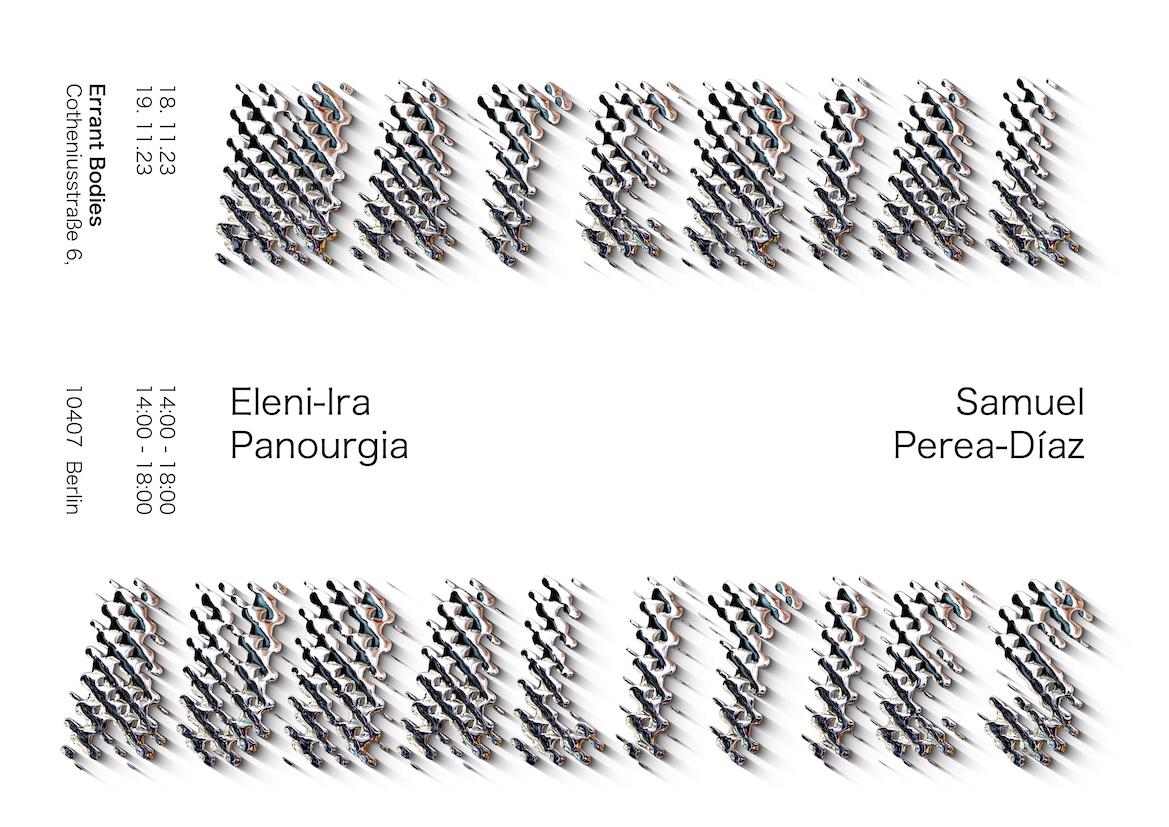
MATERIAL AURALITIES
Please join us for this Listening Event with Eleni-Ira Panourgia and Samuel Perea-Díaz
Saturday, 18.11.2023 14:00-18:00 / Sunday, 19.11.2023 14:00-18:00
Errant Bodies studio, Cotheniusstraße 6, 10407 Berlin
In this listening event, two sonic artworks converge, coexisting in the same auditory space. This convergence occurs through a dialogue that unfolds by overlapping temporal and spatial characteristics stemming from physical actions and material traces.
Eleni-Ira Panourgia's album 'Enacting Traces' is presented together with steel sculptures placed in space, and Samuel Perea-Díaz's piece, 'Untitled (topoanalysis),' is delivered across 8 channels using glass blocks. This presentation fosters a dialogue between the materialities of steel and glass. Within this spatial framework, Panourgia's sonic composition emerges through the continuous transformation of sculptural objects, while Perea-Díaz's sonic traces interact with different bodies as sounds are transmitted through blocks of glass.
The listening event invites the audience to inhabit the space that exists between these two durational sonic sculptures. It provides a unique opportunity to engage with the interplay of sound, materials, and space.
For more information, see
https://perea-diaz.es
https://eleniirapanourgia.com
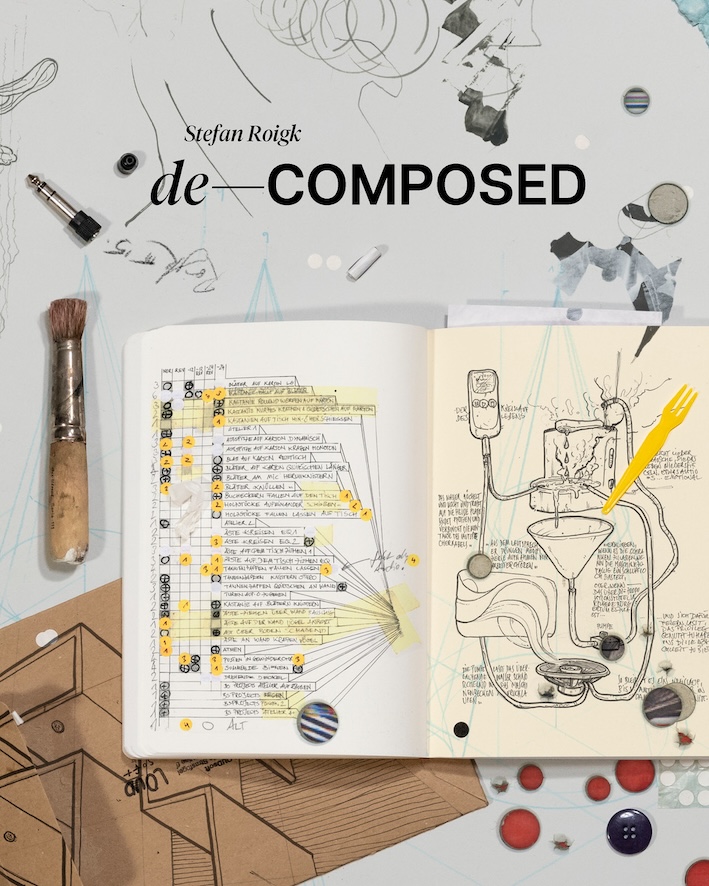
Book launch of de—COMPOSED with Berlin-based artist Stefan Roigk
Saturday, November 11, 2023 / 16:00
de—COMPOSED documents the multi-faceted practice of Stefan Roigk, including acousmatic compositions, sound installations, musical graphics and text-sound compositions. Spanning the years 2005 to 2023, the book is beautifully designed by the artist, and includes 2 audio-CDs of related sound works.
STEFAN ROIGK (* 1974) studied fine art with a focus on sound art in Hannover under Professor Ulrich Eller. In his work, Roigk pursues the intermedial interweaving of sound collage, installation, musical graphics and text-sound composition. The resulting works approach sound as a field for artistic and aesthetic research, taking it as both their departure point and central medium. Roigk's artistic focus lies on the dynamic staging of context-related fragments of everyday existence, which he imbues, in the sense of visual music, with an extraordinarily developed, visually poetic formal language. In realizing these aims, Roigk uses compositional and deconstructivist techniques of collage and assemblage for the development of stage-like spatial compositions with an implicit underlying narrative sense, in which the diverse media blend together like the instruments of an orchestra. In his work, Roigk reflects on his own living and production conditions, while investigating the political potential of aurality and tracing the subjective construction of reality. Since 2010, he has worked regularly in co-operation with visual artist Daniela Fromberg on intermedial installations and compositions.
For more information, see www.stefan-roigk.com
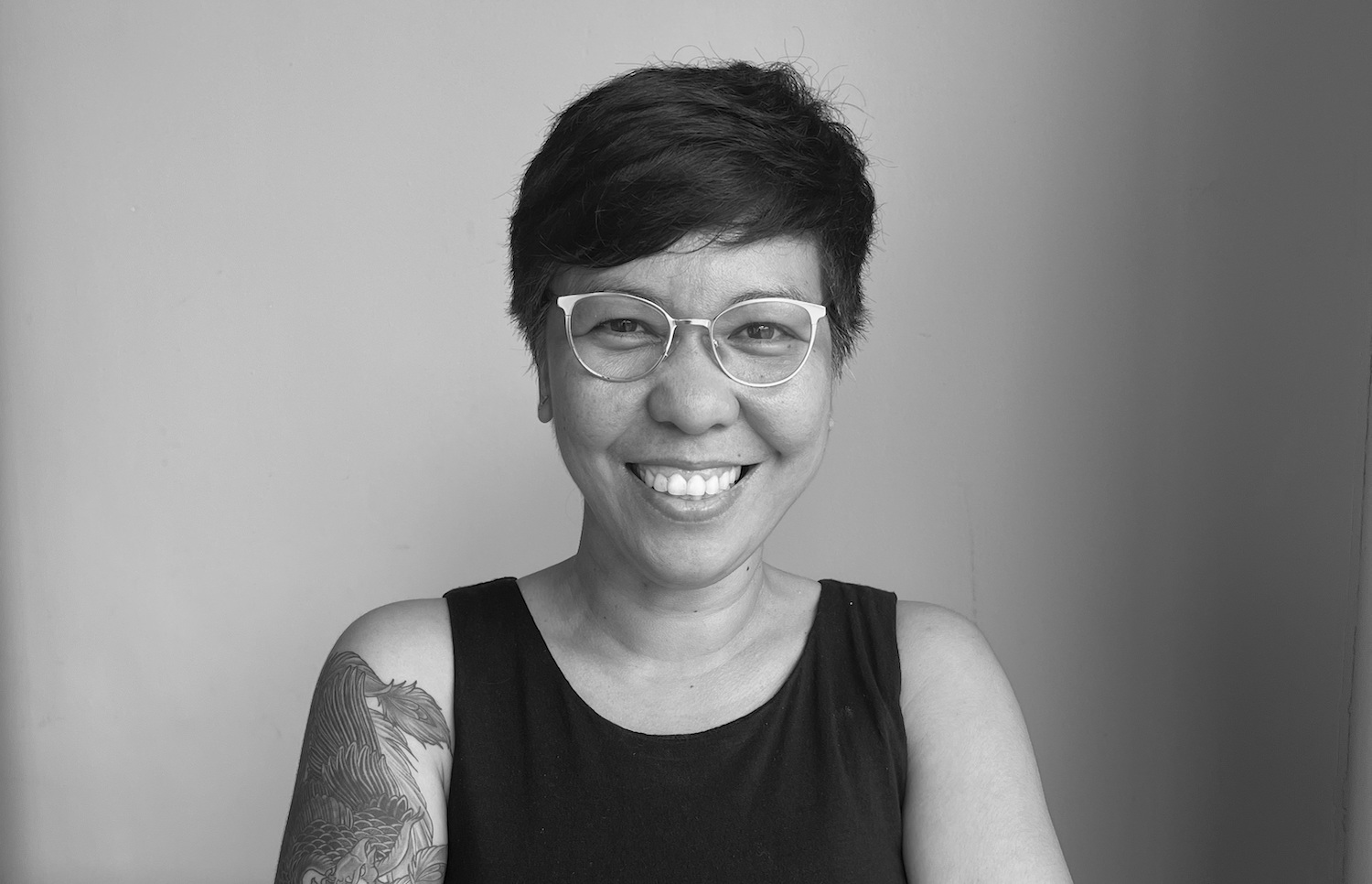
Brewing an ecology of attention - with curator Dayang Yraola
September 15, 2023 / 16:00
Dayang Yraola is a curator and sound art researcher based in Manila. She is co-curator of The Listening Biennial, 2023, as well as Associate Professor at the Department of Theory, College of Fine Arts, and an adjunct at the Department of Musicology, College of Music, University of the Philippines.
For her talk at Errant Bodies, Dayang will share and reflect upon her curatorial strategy for The Listening Biennial and its program across Southeast Asia. The curatorial core of designing the program in Asia is anchored on two catchwords that artists in the region have been using generously before the pandemic—community and connection. We consider ourselves (a) community (a barangay, a kampung, a muban, a 村, or a village), where the connections we made as practitioners serves as umbilical cord beyond the geopolitical borders. We are therefore kins, more than colleagues; we share common goals, more than projects or resources. While this ecology of practice remains in the “post-pandemic” current, with the introduction of Listening Biennial, it became curious to shift the connection from practice to attention (to listening), which implies an expansion beyond the familiar.
In the course of examining, an old favourite platform presented itself useful—tambayan (rumhängen, abhängen). Tambayan is a Filipino term which literally translates to hanging out. It is an informal gathering that maybe purposeful, but also allows "anything can happen". And this became the preferred attitude in approaching all activities that were included in the Listening Biennial Inter-Asia Program.
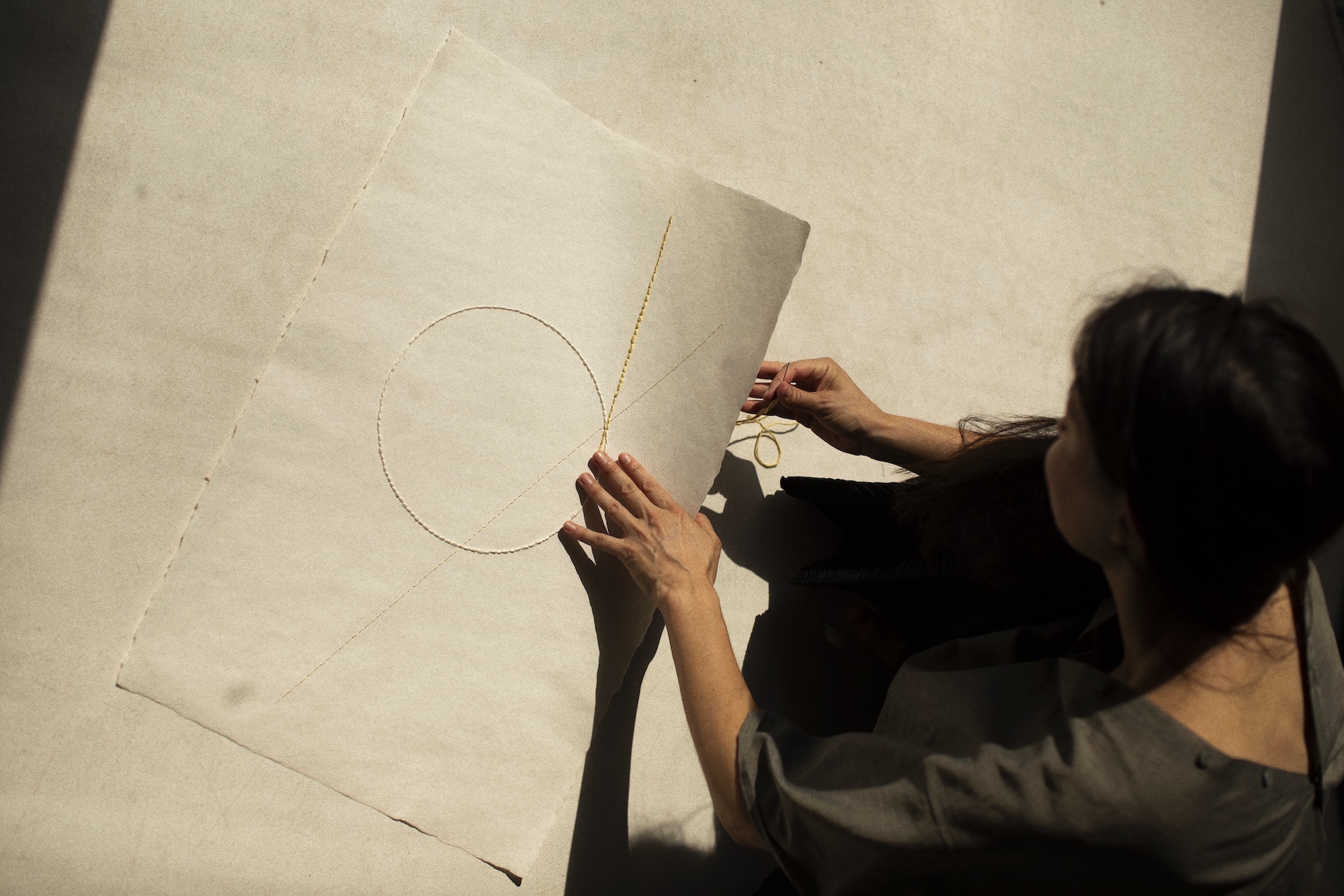
Sharing stories on sound, music and listening – with Ayumi Paul
July 23, 2023 / 17:00
As part of The Listening Biennial, we're pleased to welcome Ayumi Paul to the studio, to share stories on sound, music and listening.
Ayumi Paul is an artist and composer who works with sound, performance, ritual, paper, textile, film and installation. The interdependency of all phenomena is essential to her practice, which is dedicated to listening and engaging the non-linearity of time. She trained as a classical violinist at Hochschule für Musik Hanns Eisler in Berlin and Indiana University and performed at many of the world’s major concert halls for more than 15 years, while continuously developing her multi-disciplinary approach to exploring sound and consciousness. Paul’s work is today mostly presented within visual and performative art contexts, including Kunsthalle Osnabrück (2016 and 2020), National Gallery Singapore (2018 and 2021), SFMOMA (2021), Villa Massimo (2021), Auditorium Parco della Musica (2022), Gropius Bau Berlin (2022).
Ayumi Paul is a participating artist in The Listening Biennial 2023.
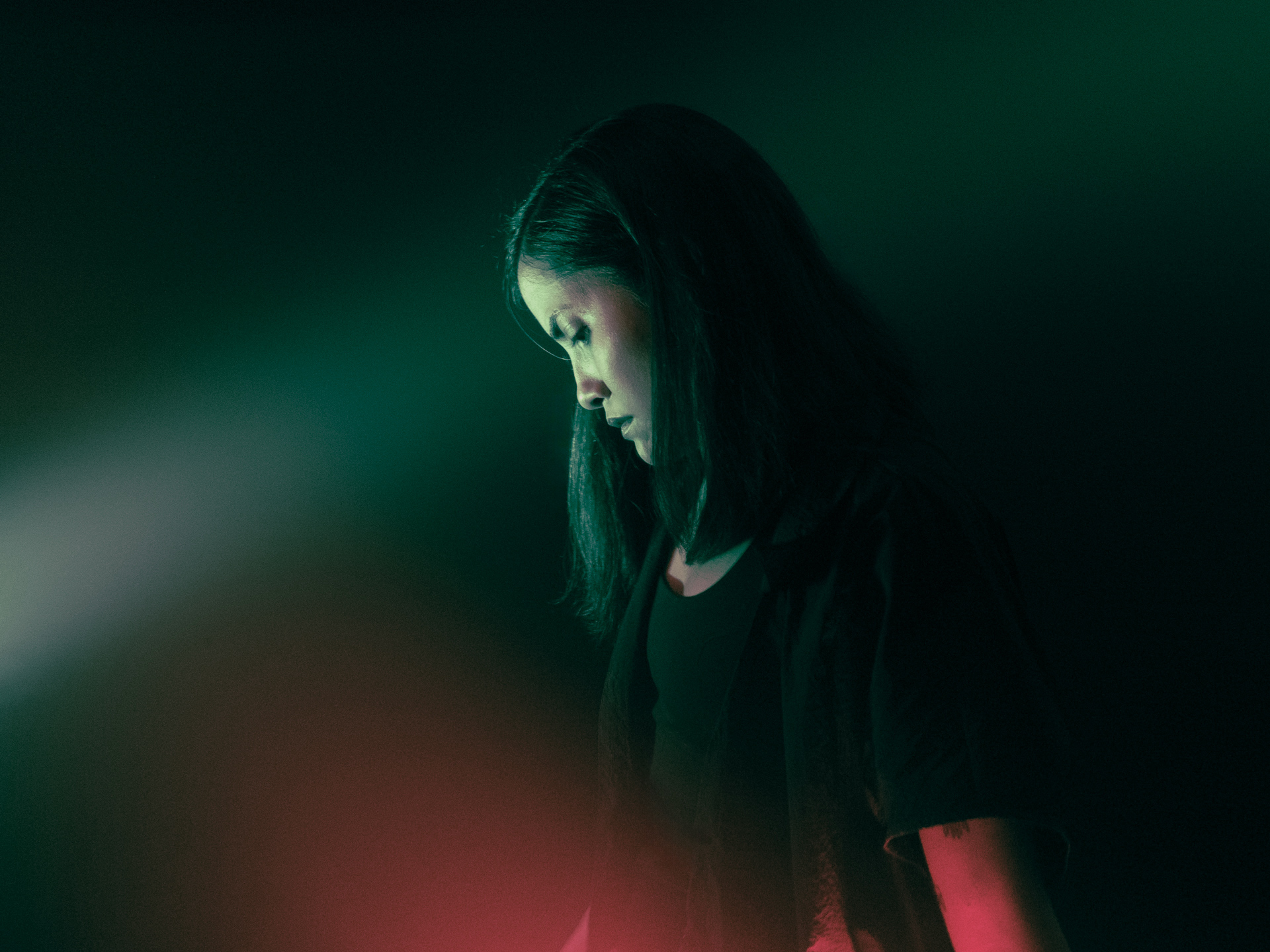
Sharing stories on sound, music and listening – with Alejandra Cárdenas
July 16, 2023 / 17:00
As part of The Listening Biennial, we're pleased to welcome Alejandra Cárdenas to the studio, to share stories on sound, music and listening.
Alejandra Cárdenas (aka Ale Hop) is a Peruvian-born artist. She began her career in the 2000s in Lima’s underground music scene. Her body of work includes diverse formats such as live shows, albums, multimedia artworks and research. Whether alone, maneuvering an intricate repertoire of electric guitar techniques, or collaborating with other artists, her live performances have an immersive and transcendental character. Last year she launched two collaborative practices: Agua Dulce, with percussionist Laura Robles, radically mutating Afro-Peruvian rhythms (recently picked as global album of the month by The Guardian), and with the sound artist Tatiana Heuman, experimenting with self-built South American clay instruments and storytelling. She also co-grounded the festival Radical Sounds Latin America (of which she was co-curator from 2019 to 2021) and, nowadays, initiated the editorial platform Contingent Sounds, aiming at facilitating critical discourses and artistic research. She has shown her work in spaces such as UNSOUND (2022), Sonic Acts (2022), CTM Festival (2022), Taiwan C-LAB (2022), REWIRE (2021), Haus der Kulturen der Welt (2021), New York’s Museum of Arts and Design (2021), Stedelijk Museum Amsterdam (2020), Somerset House Studios (2019), Heroines of Sound (2019), among others.
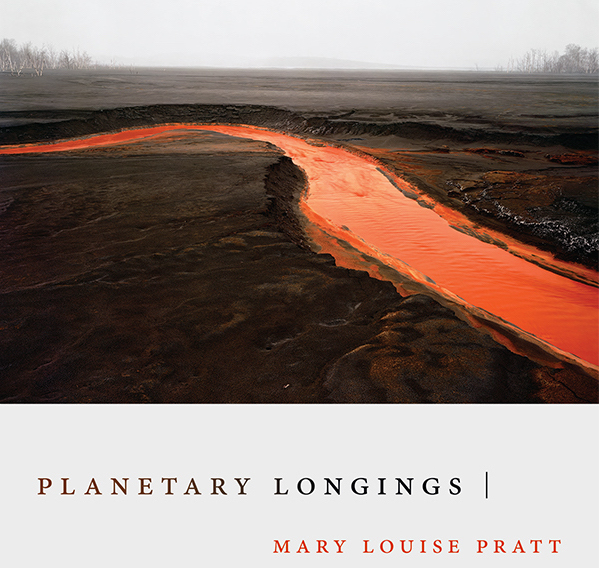
Study Session: reading Planetary Longings
June 22, 2023
Continuing with our discussions into planetarity, the afternoon will be spent reading the Introduction to Mary Louise Pratt's Planetary Longings. We'll consider the different concepts and questions raised, bringing them into dialogue with our practices, along with the issues of listening and the more-than-human.
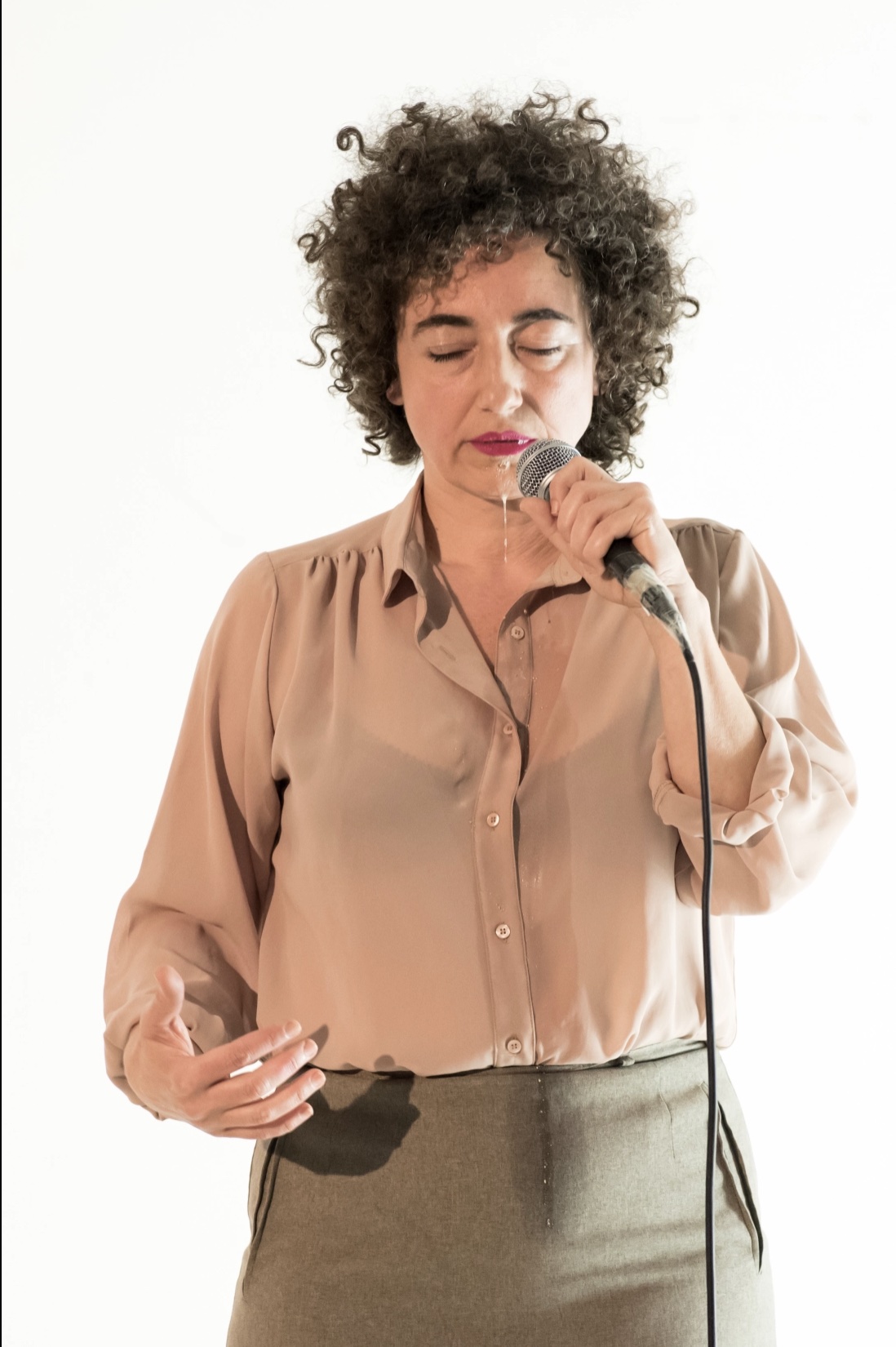
Study Session: with Siegmar Zacharias
May 23, 2023
As part of our ongoing studies into planetary listening, this study session focuses on the work of Siegmar Zacharias. SIEGMAR ZACHARIAS is a performance artist and researcher. Her works produce situations of embodied visceral thinking together with and through matter. They develop formats of performances, immersive installations, discursive encounters and curations that deal with questions of the generative ethical dynamics of transformation: agency, liquefaction, ecologies of artistic and social practice. Learning from uncontrollable material like smoke, slime, drool, nervous system and death and dying, she collaborates with humans and non-humans. Exploring the politics of intimacy & alienation toward a feminist posthumous poet(h)ics.
Siegmar will join us for an afternoon of sharing and discussion, along with listening to a new work by the artist.
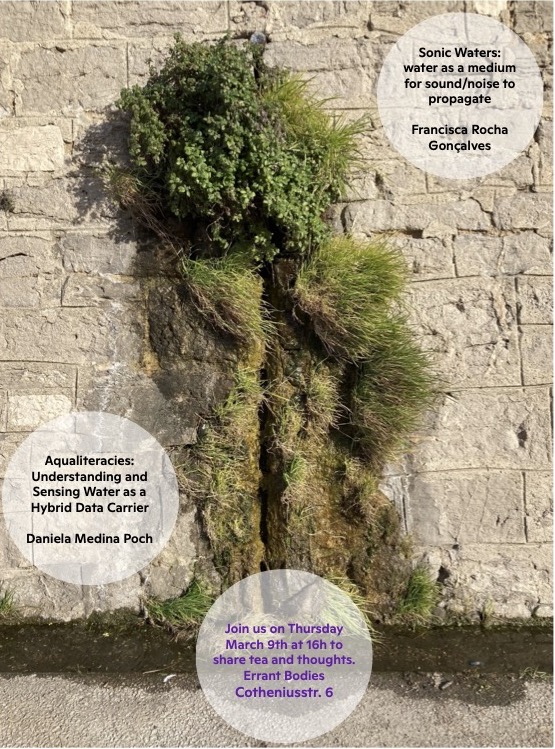
Study Session: On Watery Listening
March 9, 2023
As part of our ongoing studies into planetary listening, this study session focuses on the research practices of Daniela Medina Poch and Francisca Rocha Gonçalves. This includes a concentration on Sonic Waters: water as a medium for sound/noise to propagate (Gonçalves) and Aqualiteracies: understanding and sensing water as a hybrid data carrier (Poch). Following both these conceptual frameworks, creative and critical reflections on listening across, through and with water will be elaborated.

Study Session: On Radical Sympathy
February 23, 2023
As part of our ongoing studies into planetary listening, this study session focuses on the topic of sympathy. Including readings into the work of Jane Bennett, Stephen Darwall, and The Care Collective, the session considers how sympathy can be mobilized as a critical force, one that can enable forms of action that can extend across human and more-than-human worlds. What are the potentialities as well as limitations of sympathy? Are there important distinctions to be made between empathy and sympathy? In what sense does sympathy, as a moral position, relate to the materiality of sympathetic resonance, as what brings together often separate bodies?
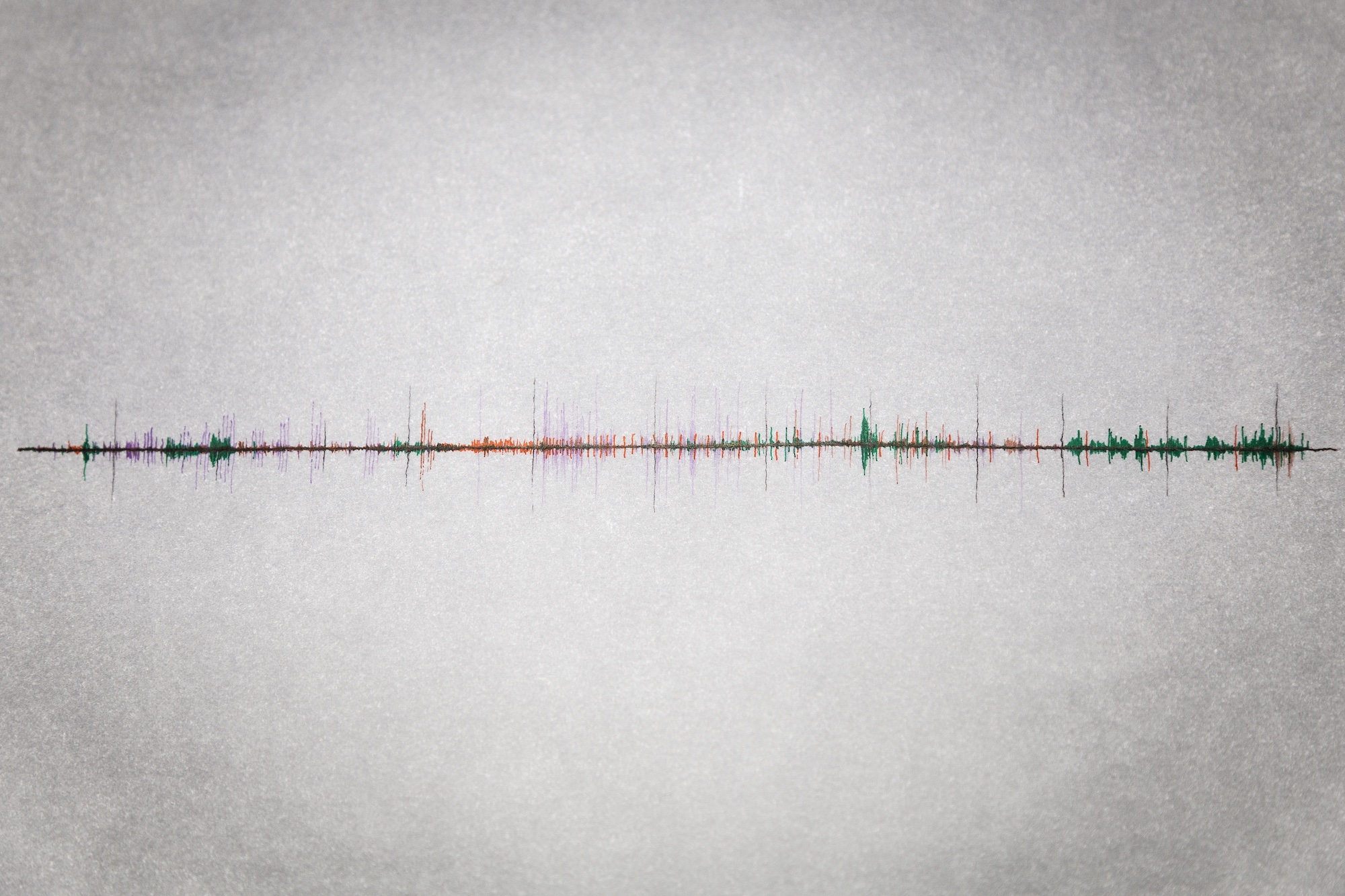
Planetary listening, waveling experience
December 18, 2022
Following our Dirty Ear Forum held in February 2022, we continued with a series of discussions on listening and more-than-human others. This led to thinking through questions of planetary ethics, ecological sonic practices, ways of attuning and storying greater relationality. We carried these discussions and reflections into developing a new radio piece for Kunstradio, Vienna. The work, Planetary listening, waveling experience, was broadcast on December 18, 2022. With Kat Austen, Miguel Buenrostro, Kate Donovan, Florence Freitag, Brandon LaBelle, Michelle-Marie Letelier.
///////
We are not solid, we are agglomerates of wave functions. Wavelings. Planetariat.
Waves across time & space, places & things. Being-in-Touch with many other forces, movements, cycles.
Oscillations that pass across and then back, MTH rhythms.
Rhythms across bodies, time. Time as wave-like rather than linear.
That is pastpresentfuture tumbling upon itself.
What does it mean to perceive as a Planetariat?
Oscillation as a way to shift between scales and the rhythms we encounter, the atmospheres we create, the conversations that hold us.
To be pulled along, down, down, and then up, to breathe as a Waveling. Waving, weaving, being-woven.
The threading of Edges & Centers, Margins & Peripheries – what happens or emerges in these exchanges, tides, winds?
And what washes up? Like driftwood. Across sands & situations. To oscillate within another time-frame, a geological wave of change, composting back into the ground.
We all make ripples.

Things That Matter: Conversation between & with Yang Yeung and Salomé Voegelin
July 16, 2022
How are you today? How was dawn?
Has the weather affected you the same way?
When was the last time you saw a rainbow?
What has been on your mind lately?
What is a book you have tried many times to finish, but have failed?
What is your favorite recipe?
What is one discovery about yourself you made recently?
What small joy have you recently experienced? How have you shared this with others?
Are your dreams in color? Can we tell each other one - be it broken or whole?
When are you the most playful?
Do you believe in magic?
If an artist were to visit you in your neighborhood, how would you spend time together?
What would you like to smuggle into forbidden territory?
What makes you feel safe?
What is freedom like?
////
Yang Yeung is a writer on art and an independent curator based in Hong Kong. She founded the non-profit soundpocket in 2008 and is currently its Artistic Director. Her recent publications include “caring is a quality: on being touched by Alecia Neo’s Care Index” (for Dance Nucleus, Singapore) and an exhibition essay on Francis Alÿs’ solo Wet feet __ dry feet: borders and games (for Taikwun Contemporary, Hong Kong). She devotes herself to following how artists think, move, make and unmake sense of the world. She continues to work towards juxtaposing contemporary art with ideas from the ancient and modern classics she teaches at the Chinese University of Hong Kong.
Salomé Voegelin is an artist and writer who works with sound’s relational capacity to develop different and plural knowledge possibilities. She writes essays and text-scores for performance and publication. Books include Listening to Noise and Silence (2010), The Political Possibility of Sound (2018) and Sonic Possible Worlds (2014/ 2021). Her forthcoming book Uncurating Sound: Knowledge with Voice and Hands (2022) foregrounds the perfidy of norms and considers the violence of contemporary art.Voegelin’s practice works through participatory, collective and communal approaches and pursues sonic pedagogies that trouble the lines of knowledge from an uncertain and plural listening. She is a Professor of Sound at the London College of Communication, University of the Arts London.
Please see reflections shared by Yang Yeung following our event, here.
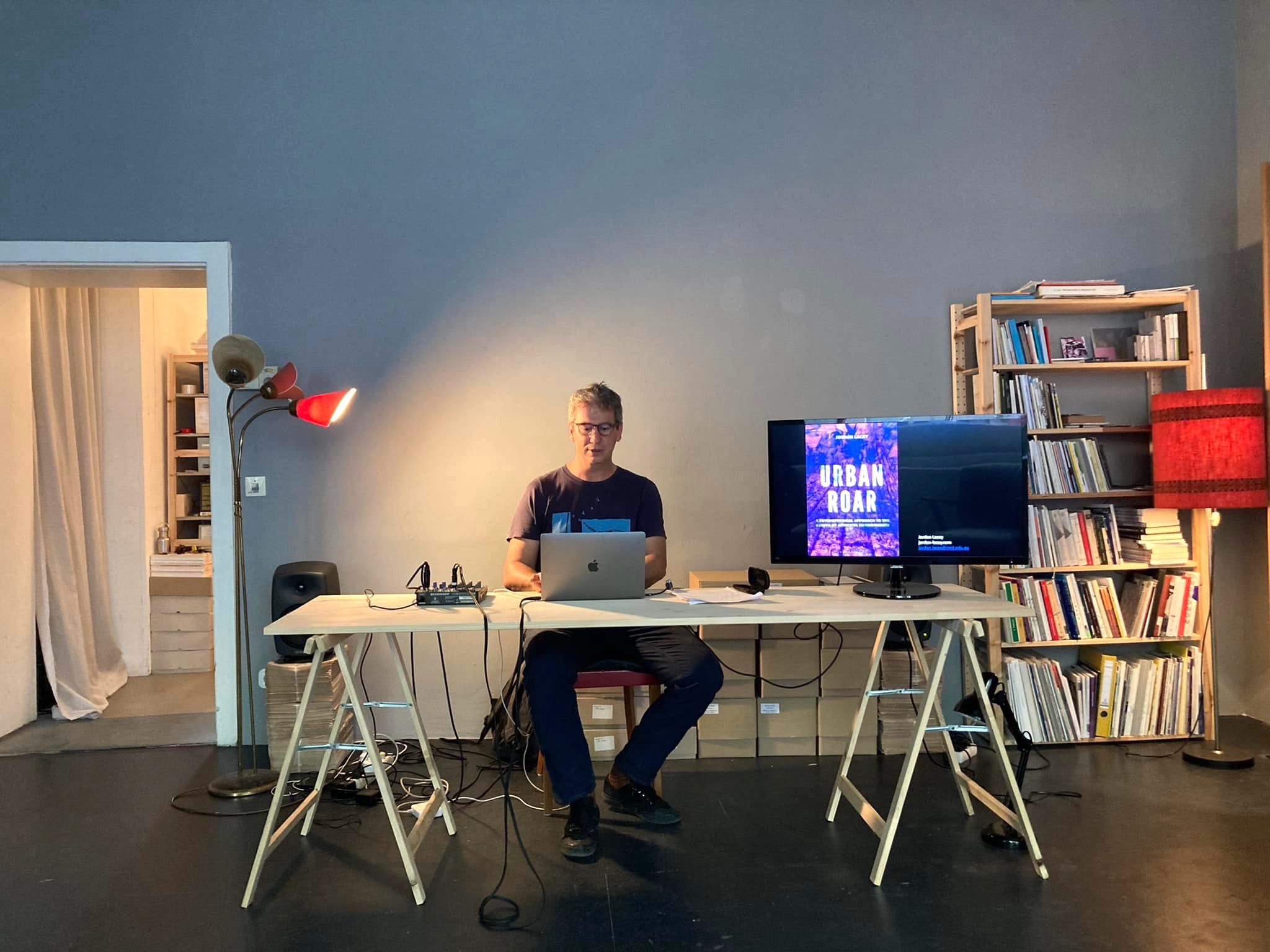
Urban Roar with Jordan Lacey
May 19, 2022
Jordan Lacey’s new book Urban Roar: a psychophysical approach to the design of affective environments brings together environmental philosophy, psychoanalysis, ambience theory and field recording practices, to present an ambitious vision for the future human habitat. In this launch, Lacey will foreground the influence of indigenous scholarship on his thinking. He argues for the importance of artistic practices that engage with the ‘spirt(s) of the land’ as means to connect society with those more-than-human forces existing beneath the threshold of human sensibility. He considers such practices to be critical endeavours in the age of the Anthropocene, which saturates the planet with images of the self. The presentation includes sounds and images from recent gallery-based and publicly situated artworks.
////
Jordan Lacey is a senior research fellow and practicing sound artist based in the School of Design at RMIT University. His research focuses on the role sound installations play in the design of public spaces in urban environments. He is author of Sonic Rupture: a practice-led approach to urban soundscape design (Bloomsbury 2016) and Urban Roar: a psychophysical approach to the design of affective environments (Bloomsbury 2022). His website, jordan-lacey.com documents multiple artworks and publications.

Soundwalking from the research-practice of sono[soro]ridades with Amanda Gutiérrez
May 4, 2022
The research-creation project Soundwalking from the research-practice of sono[soro]ridades, aims to develop the conceptual framework of the term Sono-(soro)rity, as a feminist collective practice approaching aural expressions and social coalitions. Under this subject, the presentation will introduce a small survey of activist and artistic projects by collectives embodying sound practices in Latin America, especially enacted through walks in the public sphere. Her talk will be followed by a night soundwalk featuring her latest project Sono-sono[walks], an audio Augmented Reality audiowalk that brings together the audio recordings of female-identifying, two-spirit, non-binary individuals about their experience of walking in urban space at night in Colombia, Mexico, Canada, Singapore, and Turkey.
////
Amanda Gutiérrez (b. 1978, Mexico City) explores the experience of political listening and cultural identity by bringing into focus sound and walking practices. Trained and graduated initially as a stage designer from The National School of Theater, Gutiérrez uses a range of media such as sound and performance art to investigate how conditions of everyday life set the stage for our experiences and collective identities. Approaching these questions from aural perspectives continues to be of special interest to Gutiérrez, who completed her MFA in Media and Performance Studies at the School of the Art Institute of Chicago and is currently elaborating on the academic dimension of her work as a Ph.D. studentin Arts and Humanities at Concordia University. Gutiérrez has held numerous art residencies at FACT, Liverpool in the UK, ZKM in Germany, TAV in Taiwan, Bolit Art Center in Spain, and her work has been exhibited internationally in venues such as The Liverpool Biennale in 2012, Lower Manhattan Cultural Council, Harvestworks, SBC Gallery, amongst other. Gutiérrez is currently one member of the Board of Directors of the World Listening Project.
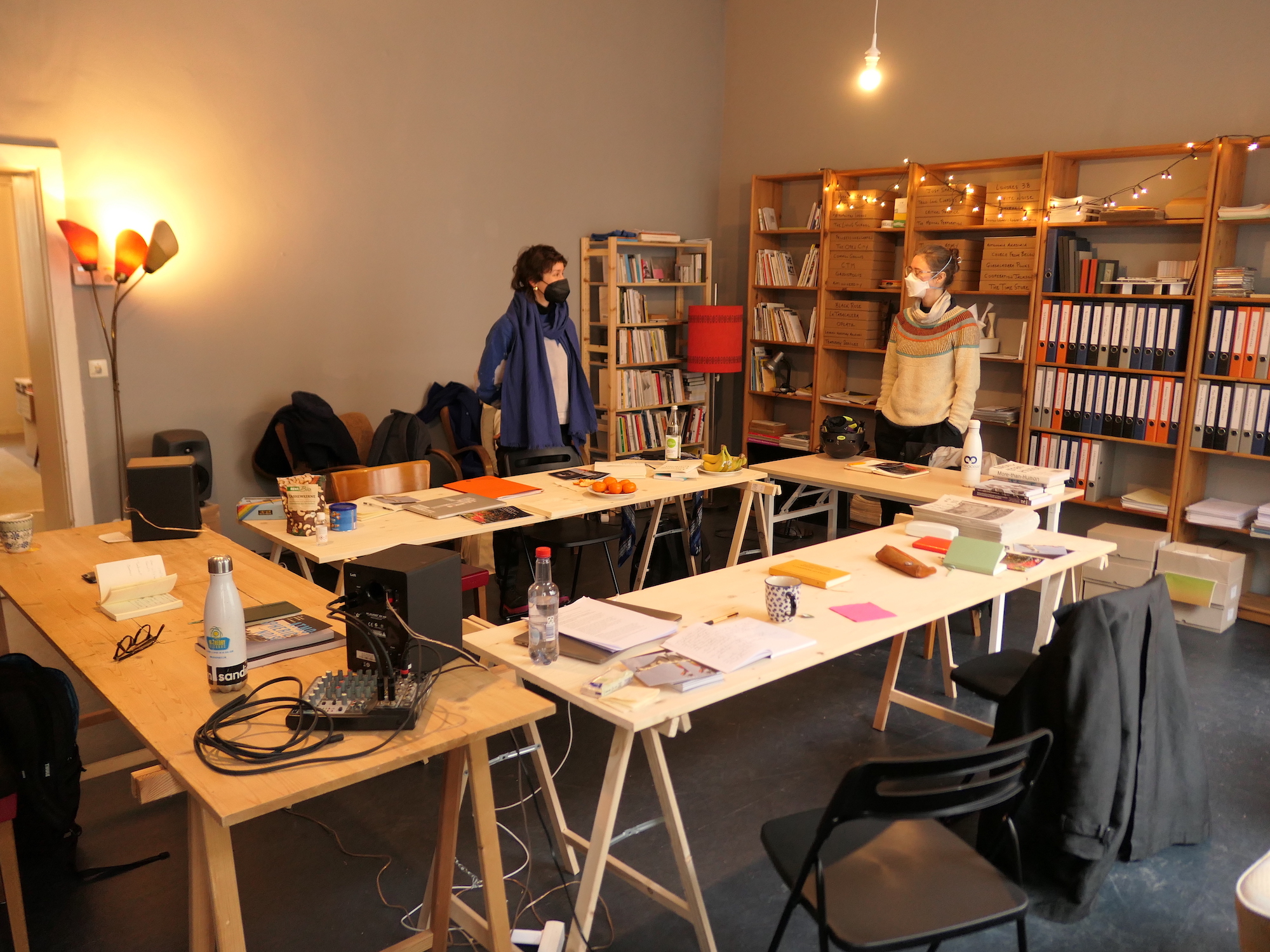
Dirty Ear Forum #10: sound, listening and the more-than-human
February 7 -11, 2022
Kat Austen
Miguel Buenrostro
Kate Donovan
Florence Freitag
Brandon LaBelle
Michelle-Marie Letelier
For this edition of the Drity Ear Forum, questions of the more-than-human are brought forward. This includes reflecting upon experiences of planetary entanglement, and how we might reimagine human community making from an ecological perspective. Through such reflection, issues around extractivism, the rights of nature, wild law, acoustic ecology and ecofeminism can be considered, allowing for a broad base of knowledge sharing. Central to the Forum is a focus on sound and listening, and in what ways sonic practices and auditory thinking can contribute to ecological and planetary practices. What does it mean to listen beyond the human? Is it possible to reorient understandings of voice to extend toward other life forms? Can sonic materiality open pathways of co-existence, and even trans-species collaboration so as to nurture biodiverse worlding? What potentialities as well as pitfalls do we encounter within models of human and more-than-human connectedness? We’ll follow these questions and concerns through the sharing of practices and knowledges, as well as open discussions so as to foster meeting points and synergies. This will lead to mapping key perspectives as well as potential future directions, so as to deepen processes and methods of planetary engagement.
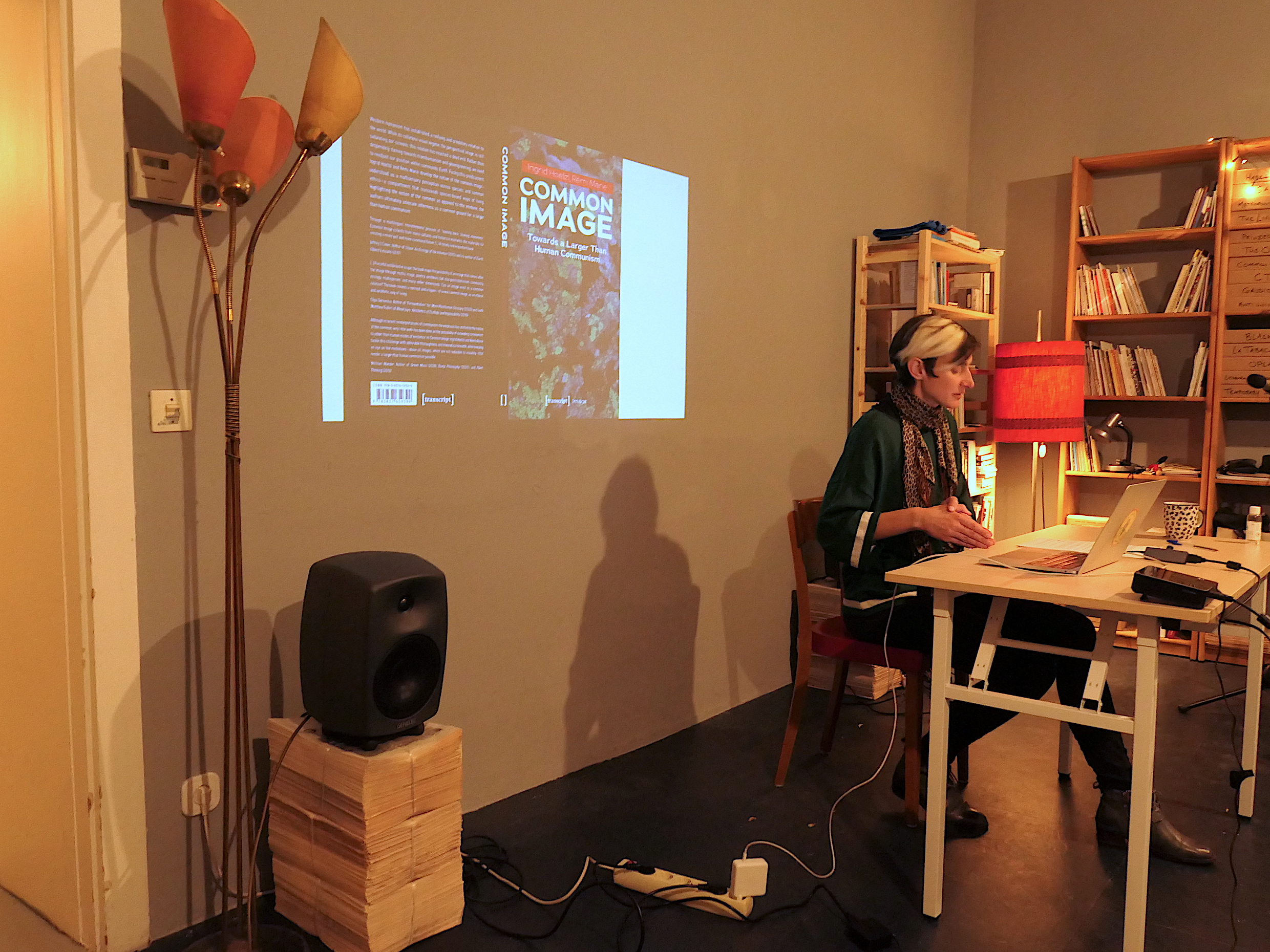
Common Image
December 3 & 4, 2021
Weaving together image theory with environmental theory, counter-anthropology, feminist materialism and ecofeminism, COMMON IMAGE explores Western and non-Western thought, past and present, poetic and mythic in search for a common image: a sensus communis, an ethico-aesthetics implicating the mineral, the vegetal, and the animal.
Western humanism has established a reifying and predatory relation to the world. While its collateral visual regime, the perspectival image, is still saturating our screens, this relation has reached a dead end. Rather than desperately turning towards transhumanism and geoengineering, we need to readjust our position within community Earth. Facing this predicament, COMMON IMAGE develops the notion of the common image understood as a multisensory perception across species; and a common ethics, a comportment that transcends species-bound ways of living. Highlighting the notion of the common as opposed to the immune, Hoelzl and Marie ultimately advocate otherness as a common ground for a larger than human communism.
In this conversation and workshop Ingrid Hoelzl will discuss the book’s central notion of the common image asking how it may institute a larger than human community-in-the-making and unmaking, and reflect on the sound-image (Chapter 4) as an immersive condition of oceanic resonance.
////
Ingrid Hoelzl is an independent scholar specializing in digital and environmental image theory, and the artistic director of the General Humanity collective bringing together theory, poetry, and performance. She holds a PhD from Humboldt-Universität zu Berlin and a diploma in Fine Arts/Visual Culture Studies from the Universität der Künste Berlin. She is the author of Der autoporträtistische Pakt (2008, Fink) and (with Remi Marie) of SOFTIMAGE (2015). Ingrid has worked as a researcher and educator at universities and art academies worldwide, most recently as a Marie-Curie Fellow at the Collegium Helveticum, ETH Zurich. Her research on the soft- and postimage, the image as transaction and the Martian image has been published widely in journals and anthologies, including Multitudes (2019), Parallax (2020), the Posthuman Glossary (2018) and The Palgrave Handbook of Image Studies (2021).

The Sound of Power
October 1 & 2, 2021
Writer and sound artist Nina Dragičević will be holding a talk and related workshop at Errant Bodies studio on October 1 & 2, 2021. She will focus on the sound of power, addressing how bureaucracy performs as a mechanism for the construction, and continuous perseverance of, domination. In what ways does bureaucracy function as an explicit representation and affirmation of power and its ideology? Through her talk and workshop she will consider how bureaucracy is present in everyday life through abstract omnipresence (power itself) + material artefacts (such as forms and clerks), a silent yet screaming force directed at a subordinate population. Following David Graeber’s golden rule of liberalism – the more government claims to be reducing bureaucratic procedures, the more bureaucratic procedures it produces – bureaucracy is seemingly applied universally, yet it primarily coordinates inequality. And this – the domination-drive of bureaucracy and its drive for the formalization of inequality – constructs its specific sonority as well as its specific sonic policies. We shall listen to them and try to articulate the sound of bureaucracy as a mechanism of power through a critical and radical feminist perspective.
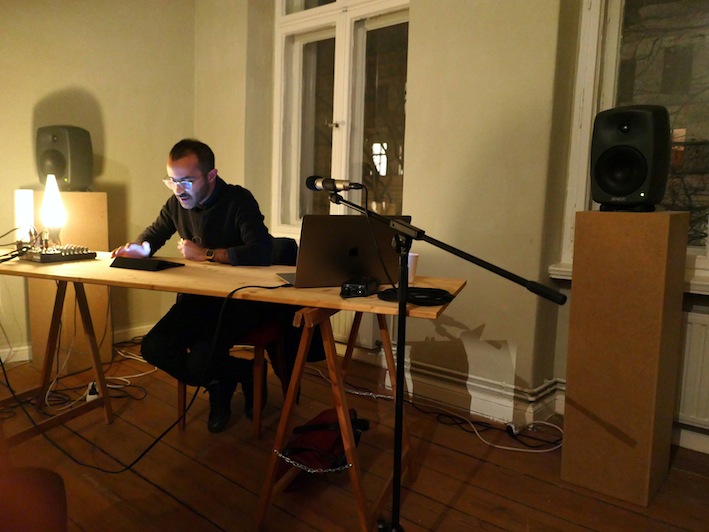
Audible Intimacies: Migrant Saints in a Godless City
lecture by Omar Kasmani
February 27, 2020 / 19:30
As part of Communities in Movement, a research project in collaboration with Savvy Contemporary, Berlin.
We listen to sonic fragments recorded during a Sufi ritual of remembrance in Berlin. We sense how in the invisible contingency of sound – a sonic mise-en-scène as it were – migrants come close to removed saintly figures, places and times. To be embroiled in sound such, that is the in-between and the with-each-other – what Salome Voegelin has called interbeing – is to embrace affect’s relational poignancy, its adeptness to resist the partitioning of time, space and bodies, its capacity for suturing worlds.
Religious sounds – especially for those believers affected by displaced geographies and geo-chronologies of migration – offer forms of critical intimacy with sacred histories. Equally so, sonic scenes in religious ritual offer a bracketed condition of political possibility in the present. I invite an intimate listening of an Islamic ritual as a way to appreciate how religion’s ephemera, in particular its sonic-spectral iterations bear the potential to bend norms of religion’s visibility in the urban, thus also elude its surveillance and governance. I am interested in how sound’s obfuscating presence survives beyond the ritual and gestures at the limited ways in which migrant/ minority religion might test, even kink normative orders of a so-called godless city.
Omar Kasmani is a social-cultural anthropologist and a post-doctoral Research Fellow at Affective Societies at Freie Universität, Berlin. His work pursues ideas of be/longing, queer futurities and public intimacy – a research practice that is best read across the study of religion, queer and affect theory. Born and raised in Karachi, Pakistan, Omar is a Berliner-by-love. He has co-edited the book Muslim Matter (Revolver Publishing 2016) and his currently working on his first monograph on saintly intimacy and unstraight futures in Pakistan.






Book presentation: Slow Down Fast, A Toda Raja
Camila Marambio & Cecilia Vicuña
Errant Bodies Press
Saturday, 21st September, 2019 / 17:00
The event will take place at the Errant Bodies Studio, in conjuntcion with Tertulias organized by Kap hoorn.
"This is a book of the female giggling that terrifies men." James O'Hern, poet.
Slow Down Fast / A Toda Raja (2019, Errant Bodies Press) is the latest collaboration between Cecilia Vicuña and Camila Marambio.
In this brilliant intergenerational dialogue, curator Camila Marambio and Cecilia Vicuña, one of the most intriguing Indoamerican artists of our times, converse about mestizaje/miscenegation, ecological disaster, eroticism and decolonization in their multilingual, irreverent and humorous slang.
The book, which they began working on in 2015 through recorded meetings that were then transcribed, is published in Berlin by Errant Bodies Press, and will be presented by Cecilia Vicuña, with Camila Marambio present via Skype.
The true performance is that of our species on Earth: the way we cause suffering to others, the way we warm the atmosphere or cause other species to disappear.
When we began this book-conversation in 2015, we shared a practice of the transformative power of performance, or pre-formance, dreaming of ways to extend it. Today, the #FridaysForFuture, #MeToo movement, #BlackLivesMatter, and other mobilizations for refugees and ecological justice have changed the meaning of past and future performance, unleashing the potential of a quantum change in collective consciousness.
May our words contribute to empower its rising energy!


Social Acoustics: Listening With, For, Against
Monday, June 17, 2019 / 10:30am – 5:30pm
The seminar focuses on questions of political subjectivity and the creative processes that inform the making of experimental communities or self-built families. This includes reflecting upon practices of decolonization and commoning, as well as bringing into question the general field of agency: what are the potentialities and shortcomings of “agency” today? In what way might we rethink understandings of agency and what may constitute “social movements” within today’s biocapitalistic and posthumanist realities? What modalities of governance might be built from the networks of care and support we craft as migrant subjects?
Including guests:
Agata Lisiak, Professor, Bard College, Berlin
Bonaventure Ndikung, Curator / Artistic Director, Savvy Contemporary, Berlin
Dimitris Papadopoulos, Professor, University of Nottingham, UK
Jelena Petrovic, Lecturer, Academy of Fine Art, Vienna
Moderated:
Brandon LaBelle, Professor, The Art Academy, University of Bergen
The day’s discussions will be followed by the launch of the new issue of Free Berlin, starting at 7:30pm, with friends and colleagues.